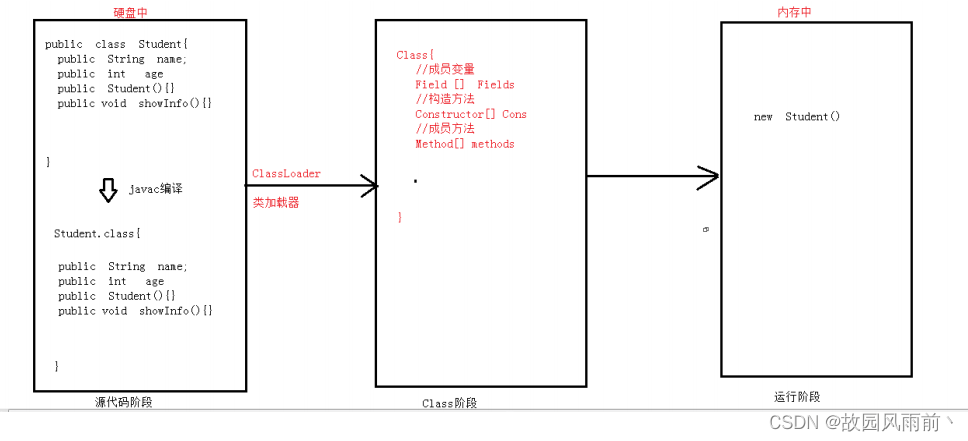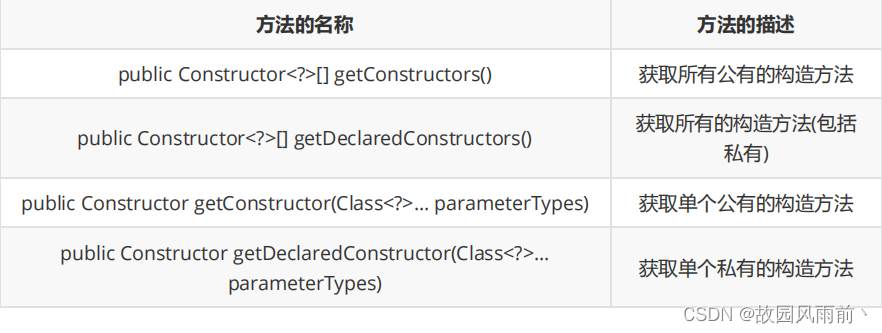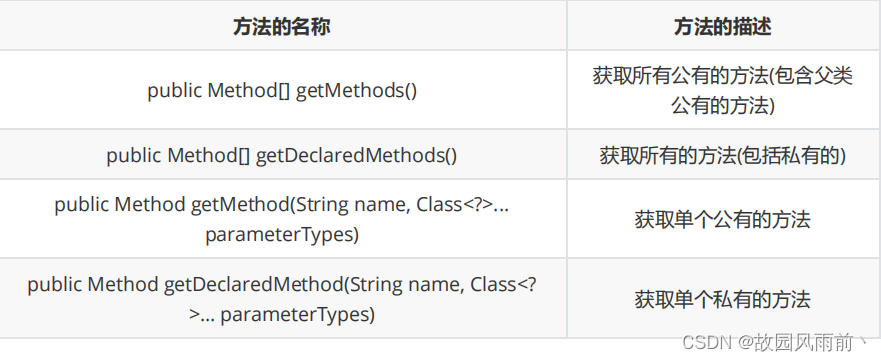一、Junit
1.Junit主要用于做局部测试,局部测试 局部测试可以快速帮助查找bug
2.测试分类:黑盒测试与白盒测试
3.黑盒测试:功能测试(按照需求的文档来进行测试)与接口测试 比较简单
4.白盒测试:测开编写自动化的脚本
5.Junit使用步骤
定义一个方法 (方法修饰符public 返回值只能使用void)
在方法上加上注解@Test
jar下载地址:https://mvnrepository.com/
新建一个lib文件
将jar放到lib目录下
将jar添加项目依赖
二、反射的概念
1.所有的框架都使用了反射技术
java中所有类在反射面前都是裸体(可以通过反射获取到所有的资源,包括私有的)
2.反射机制:将类的各个部分组成一个新的对象Class对象

三、获取Class对象
1、通过调用类的getClass方法进行获取,对象.getClass()
2.通过当前类名.class来获取
3.通过Class.forName(完整的包名+类名) 最常用,
四、获取构造方法

五、获取成员方法

六、获取成员变量

七、案例
不改变java代码任意获取类中的方法
通过配置文件将需要的数据传输进去(properties文件键值对)
代码-需要获取方法的类
package com.getmethod;
public class Student {
private String name;
private int pws;
public Student() {
}
public static void show(String name,int pwd){
System.out.println(name);
System.out.println(pwd);
}
}
配置文件 admin.properties
代码-配置文件工具类
package com.getmethod;
import java.io.IOException;
import java.io.InputStream;
import java.util.Properties;
public class Properutils {
private static Properutils properutils;
private static Properties properties;
private Properutils(){
properties=new Properties();
InputStream resourceAsStream =Properutils.class.getResourceAsStream("admin.properties");
try {
properties.load(resourceAsStream);
resourceAsStream.close();
} catch (IOException e) {
e.printStackTrace();
}
}
public static synchronized Properutils getIntance(){
if (properutils==null){
properutils=new Properutils();
}
return properutils;
}
public static String getValue(String key){
return properties.getProperty(key);
}
}
代码-测试类
@Test
public void show2() throws ClassNotFoundException, NoSuchMethodException, IllegalAccessException, InvocationTargetException, InstantiationException {
String className = Properutils.getIntance().getValue("ClassName");
String methodName = Properutils.getIntance().getValue("MethodName");
String parm = Properutils.getIntance().getValue("parm");
String typeName = Properutils.getIntance().getValue("TypeName");
Class<?> aClass = Class.forName(className);
Object o = aClass.newInstance();
Constructor<?> constructor = aClass.getConstructor();
Object o1 = constructor.newInstance();
Class[] getclass = getclass(parm);
Object[] getty = getobj(parm, typeName);
if (getclass == null && getclass.length <= 0) {
Method declaredMethod = aClass.getDeclaredMethod(methodName);
declaredMethod.invoke(o);
} else {
Method declaredMethod = aClass.getDeclaredMethod(methodName, getclass);
declaredMethod.invoke(o, getty);
}
}
public static Class[] getclass(String parm){
if (parm==null||"".equals(parm)){
return null;
}else {
List<Class> li=new ArrayList<>();
String[] split = parm.split(",");
for (String s:split){
if (s.equals("String")){
li.add(String.class);
}else if (s.equals("int")){
li.add(int.class);
}else{
li.add(Object.class);
}
}
Class[] classes = li.toArray(new Class[li.size()]);
return classes;
}
}
public static Object[] getobj(String parm,String typeName){
if (parm==null||"".equals(parm)||typeName==null||"".equals(typeName)){
return null;
}else{
List<Object> li=new ArrayList<>();
String[] split = parm.split(",");
String[] split1 = typeName.split(",");
for (int i=0;i<split.length;i++){
if (split[i].equals("String")){
li.add(split1[i]);
}else if (split[i].equals("int")){
li.add(Integer.parseInt(split1[i]));
}else {
li.add((Object)split1[i]);
}
}
Object[] objects = li.toArray(new Object[li.size()]);
return objects;
}
}最后
以上就是个性纸鹤最近收集整理的关于25.反射、Junit、获取Class对象、获取构造方法、获取成员方法、获取成员变量、案例的全部内容,更多相关25内容请搜索靠谱客的其他文章。
本图文内容来源于网友提供,作为学习参考使用,或来自网络收集整理,版权属于原作者所有。








发表评论 取消回复